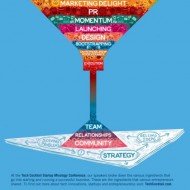Posted by Managementguru in Startups
on Apr 10th, 2015 | 0 comments

Let’s start the discussion traditionally with a Merriam-Webster definition, a startup means “the act or an instance of setting in operation or motion” or “a fledgling business enterprise.” What does the American Heritage Dictionary suggests is “a business or undertaking that has recently begun operation.” A startup is an organization formed to search for a repeatable and scalable business model. A startup is a business that has the capability to grow very rapidly, ultimately becoming a “real company” with an HR department, divisions, and processes. Steve Blank calls #startups a “temporary organization designed to discover a business model.” Startups, when they begin, have no procedure, no culture, and no recurring business model. All they know is that they have the potential to address a huge market if they can figure their business model out, and then scale quickly enough to stay ahead of the competition. As a founder you set off with a vision of a #product with a set of features and a series of assumptions about all the pieces of the business model. The inevitable questions to be answered are: Who are the customers/users? What’s the distribution channel? How do we price and position the product? How do we create end user demand? Who are our partners or Co-Founders? Where/how do we build the product? How do we finance the company, etc. When you go around and ask people however, startup really means a young company generally building something focused on technology. Every business goes through the same four phases: #Idea Startup Growth Maturity This maps rather well to Steve Blank’s 4 stages described in four steps to the epiphany: Customer discovery Customer validation Customer creation Company creation When is a startup no longer a startup? “A startup is no longer a startup when the product/market fit has absolutely been achieved, profitability or considerable revenue with a path to profitability has been obtained, and if any one person left the company would still survive and not get swayed by the departure.” Being a start-up is mostly about work environment and employee interactions. A start-up graduates to being no longer a start-up when interactions across hierarchies become formalised. For example, if you can no longer walk into the CEOs office to pitch your idea and (s)he does not know you by name, you are no longer working for a start-up. Also, if a company begins to have rules about employee progression (such as you need to spend 2 years before being promoted or moving into a new role etc) then it stops being a start-up. #Companies which have strict rules on which schools to hire from or firm ideas on how many years of experience should be required for which role, are no longer start-ups. I am not saying that start-ups do not have any criterion for hiring but these criterion, in a start-up, these would be based on things other than simply the pedigree or the number of years of experience. Start-ups hire people if they see passion and willingness to go the extra mile rather than for merely the right pedigree. Source: http://www.quora.com/Faguni-Jain Having made the above points – if a company crosses a certain threshold of revenues and/or profits, it should also declassify itself as a start-up – though it can continue to maintain the ‘start-up environment’ for its employees. Some Startup Mantras for Beginners would be: Be Careful with Cofounders Startups Take Over Your Life It’s an Emotional Roller-coaster It Can Be Fun Persistence Is the Key Think Long-Term Lots of Little Things to be considered It’s much more of a grind than glamorous Start with Something Minimal Engage Users Be Willing to Change Your Idea after User Interaction...


